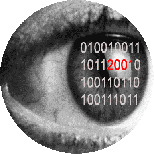Reexamining WCLI and PPTW in the contexts of our institutional, statewide, and national K-16 English Studies needs has enabled Ball State to make a successful bid to host Computers and Writing 2001. In other words, by building on Nellen and Mayo's "Practical Theory" model, learning from "Evolution, Revolution, and Implementation: Computers and Writing for Global Change," moving from learning as a personal to a communal experience in diverse and authentic situations, we've been able to expand our in-house faculty development plans and "reflective inquiry ethos" to attempt to address the needs of a larger audience, the computers and writing community. In fact, the theme of this year's conference embraces what we've learned and invokes a question that many in our program and the general community are asking:
 This conference will explore this question under the theme “2001: A Cyber Odyssey,” 17-20 May 2001. The conference mission: to share ideas, formulate workable plans, and take specific actions to reach out beyond our classrooms in order to forge relationships that will enhance the use of computer technology for teaching, learning, and research.
This conference will explore this question under the theme “2001: A Cyber Odyssey,” 17-20 May 2001. The conference mission: to share ideas, formulate workable plans, and take specific actions to reach out beyond our classrooms in order to forge relationships that will enhance the use of computer technology for teaching, learning, and research.
The theme takes its lead from the Arthur C. Clarke and Stanley Kubrick landmark film 2001: A Space Odyssey, which follows the arc of human evolution from primitive tool use to inter-planetary and intra-psychic exploration. “2001: A Cyber Odyssey” invites investigation of a range of questions. What technologies have we adopted out of necessity? What are our current choices? Which directions should we follow? And what pitfalls should we avoid? Our keynote speakers--including Sree Sreenivisan, David Bolter, and Susan Leigh Starr--will touch on these topics from different perspectives. Our conference objectives include:
- demonstrating positive uses of computer technology in contemporary society, such as community building, knowledge making, and information sharing
- promoting effective and efficient use of computer technology for teaching, learning, and research in other disciplines as well as businesses and industries
- developing new ways of implementing computer technology in our intellectual and personal lives
- shaping policy and perceptions about the use of computer technology in the classroom, office, and home
- educating others about the effective and appropriate uses of computer technology for teaching, learning, and research
- seeking ways to actively involve community and industry in Computers and Writing
- providing a collaborative conference voluntarily facilitated by members of the computers and writing community.
By mapping the technologies we use through paying attention to the important underlying values they reinforce, the CW2001 committee has had the opportunity to reflect on the tools we've used in the past, the tools we're using now, and the tools we may use in the near future. Just as Susan sought out human resources to meet and (re)define goals and community needs, so too has the cycle once again expanded and (re)contextualized.
What's Next?
|
|
Our conclusion is another series of steps leading toward an epiphany. We see our department, university, and the field of computers and writing moving in many positive directions in the next five years. In a recent presentation at this year's Watson Conference, one of Ball State University's "Writing, Computers, and Literacy Initiative" teachers categorized general response toward computer-mediated teaching trends in our department. As a member of the Contract Faculty Steering Committee John Prince has a unique perspective, and suggests "the order of these categories . . . represent the range of attitudes from the more positive to the more negative" (Prince).
Prince's categories are realistic. And they suggest directions we might take to encourage our faculty to reflect on their own teaching practices. Philosophically, instead of asking "how can we change our pedagogy to work with the software we have available to us," we need to encourage our teachers to ask "how can we manipulate the tools we have to augment our well-practiced teaching pedagogy." By encouraging this mindset, and by considering what Dickie Selfe often refers to as "sustainable teacher-training plans," we can now strive for these goals:
|
When we took our first steps with Epiphany in 1997, we could not have predicted where we would be today. Perhaps if we were to offer advice to others contemplating a similar excursion it would look something like this: Be always responsive to the needs of the community you are working with, especially sensitive to the people involved. Traveling this path has led us to some surprising places, always challenging us to question, assess, reflect, and to begin anew. We hope to maintain this cycle, to expand our thinking and continue the journey.